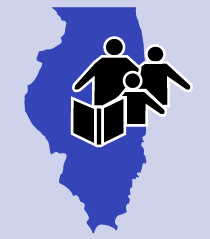Daily routines like waking up, getting dressed, eating meals, bathing and bedtime are ideal learning times for young children.
“Infants and toddlers learn best through everyday experiences and interactions with familiar people in familiar contexts.”
– National Early Childhood Technical Assistance Center
Everyday Routines
Routines Provide a Sense of Security

Think about how you begin your day. Are there certain things that happen for you to feel awake and ready to tackle your day? Coffee, a shower, quiet time? Our morning routine can set the tone for the rest of the day. What about your children? Do they have certain “rituals” during their day?
From the beginning, we probably create routines with a newborn. We may feed her in a certain chair every time. We may sing the same songs at bedtime or use the same loving voice when we change his diaper. It is during these early routines that we develop close relationships with our children. They know that they can count on us to meet their basic needs. It also allows us to truly be in tune with our child’s responses.
Routines help young children know what they can expect next. This helps them feel secure and gives them stability. They can also feel more relaxed and calm. It is important to understand the difference between a routine and a schedule.
For more information about routines and schedules and how they can help with day-to-day family life, read the full article.
Daily Routines Are Learning Times
Engage My Brain, Body, and Voice to Help Me Grow
You can help promote healthy development for a child with developmental delays by involving them through conversation and simple actions during regular activities throughout the day. It’s easy as talking to your child about your everyday routines.
Throughout the day
Wake Up
- Help me learn my body parts, clothing names, sequence (first my sock, then my shoe, etc.)
Mealtime
- Describe texture, taste, colors, opposites (hot/cold, soft/hard)
- Encourage me to feed myself with a spoon, cup, or my fingers
Need an iPad or a Hotspot for Live Video Visits?

Many families are receiving Early Intervention services through live video visits. To help families with technology needs, the Early Intervention Clearinghouse has added several technology devices to the lending library:
- iPads with a cellular data plan (device and Internet access)
- iPads without a cellular data plan (device)
- Hotspot with cellular data plan (Internet access)
To request a device, please complete our Device Loan Request Form (also available in Spanish). For more information about live video visits, see our tip sheet Introduction to Early Intervention (EI) Live Video Visits: Frequently Asked Questions (also available in Spanish).
Routines in Early Intervention

Early intervention (EI) services are provided by a team, including parents. Once the individualized family service plan (IFSP) is in place, EI providers begin services to address the identified outcomes. EI visits usually last only an hour, so most of the intervention is done by parents and other caregivers without the providers present. Parents might often wonder how they can continue and support the work of the EI providers after the visit ends. At the end of a visit, families can request a visit report that outlines the activities that were done during the visit. This report may also include ways that the activities can be practiced during the family’s daily routines.
There are several questions parents can ask providers to help get started:
- When can I work on this outcome/skill during my day?
- What can I do to support my child?
- What materials will I need, if any?
For sample strategies to address during a family’s daily routines, read the full article.
Enter our Giveaway!
FalL Newsletter Prize!
Spending time together while reading aloud helps to create strong parent-child bonds and promotes healthy brain development. Complete the entry form below for a chance to win a read-aloud prize package!
All entries received by 11/30/2023 will receive a gift in the mail.
The winner can choose the preferred language for books.

Recommended Books and Resources
Early Intervention Timelines and Your Rights

The Early Intervention (EI) program ensures infants and toddlers with developmental delays, certain diagnosed medical conditions, or other factors that put them at risk of substantial delay have the best chance for healthy development. Children can access a range of therapeutic, developmental, and social-emotional services while their families receive coaching and support to further the gains of their children.
After you are referred to the Illinois Early Intervention Program, you have the right to:
- Be contacted by your Child and Family Connections (CFC) office within two business days to answer questions and schedule an intake meeting.
- An evaluation of your child and an Individualized Family Service Plan (IFSP) within 45 days of referral and consent to the evaluation. The IFSP must be reviewed at least once every six months and re-evaluated annually.
- EI services that start as soon as possible, but no more than 30 days after you agree to your child’s IFSP.
You also have the right to receive information in your native language and in a way that can be understood and the right to disagree, complain, and request mediation. Written complaints and requests for mediation or impartial administrative resolution should be submitted to the Illinois Department of Human Services according to the procedures outlined here: State of Illinois Infant/Toddler & Family Rights Under IDEA for the Early Intervention System. This tip sheet is available in printable PDF format.
Important Updates
The State Systemic Improvement Plan (SSIP) Update

Scale up efforts are progressing! The five new Child and Family Connections offices that have joined our effort are meeting regularly and developing their action plans. They are determining their initial capacity-building needs and raising awareness of SSIP activities in their local areas. Each area is developing a plan individualized to the needs of the children, families, and providers in their area. The teams continue to be supported by system partners and are meeting with the leadership in the original three areas as well.
The original sites continue their efforts around family engagement. In some areas, this involves beginning to use the fidelity tool as a self-assessment to determine professional development needs. We are also continuing our technical assistance effort with our federal partners to examine the accuracy of our child outcomes data.
If you have any comments or questions about the SSIP, please email Chelsea Guillen at cguillen@illinois.edu.
Upcoming Events
Early Intervention Town Halls (Virtual)
The Director of the Bureau of Early Intervention is hosting one more virtual town hall in 2023 with families of children in early intervention. During this time, you can share your experiences, ask questions, and voice your suggestions to improve early intervention.
Upcoming Meeting Dates:
Thursday, November 9, 2023
Spanish – 6:30-7:30 pm
English – 7:30 – 8:30 pm
Register online for the town hall meeting or contact Alejandra Griffet, by email: agriffet@illinois.edu or by phone: 217-333-5841
Cookies at the Clearinghouse
Join us for a holiday open house! Homemade cookies, hot cocoa and punch will be served. This is an excellent opportunity to explore the great resources available on young children and early childhood education for families, providers, and students.
WHEN:
Thursday, December 7, 2023
3:00 – 6:00 pm
WHERE:
IL Early Intervention Clearinghouse
Children’s Research Center, Lower Level Room 20
51 Gerty Dr. Champaign, IL
(Behind the Illini Credit Union on First Street)


